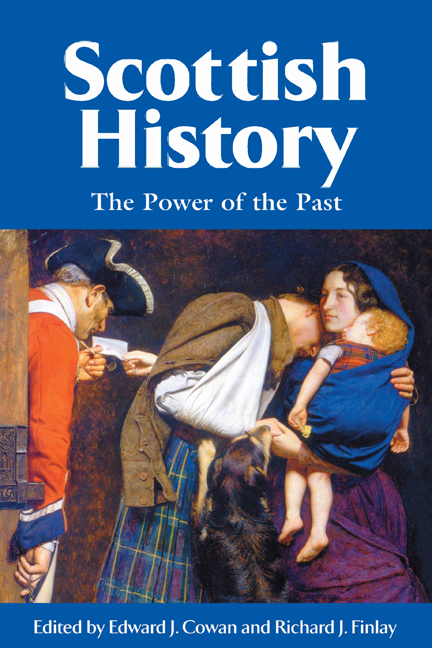Book contents
- Frontmatter
- Contents
- Contributors
- Introduction
- 1 The Picts‘ Place in the Kingship's Past Before John of Fordun
- 2 The Demonisation of King John
- 3 Late Medieval Scotland and the Matter of Britain
- 4 In Search of the Scottish Reformation
- 5 Civil Society and the Celts: Hector Boece, George Buchanan and the Ancient Scottish Past
- 6 The Covenanting Tradition in Scottish History
- 7 ‘What's in a Name?’: Pedigree and Propaganda in Seventeenth-Century Scotland
- 8 The Ideological Uses of the Picts, 1707-c.1990
- 9 The Jacobite Cult
- 10 Queen Victoria and the Cult of Scottish Monarchy
- 11 ‘Their Laurels Wither'd, and their Name Forgot’: Women and the Scottish Radical Tradition
- 12 Tomorrow's Ancestors: Nationalism, Identity and History
- Index
7 - ‘What's in a Name?’: Pedigree and Propaganda in Seventeenth-Century Scotland
Published online by Cambridge University Press: 24 September 2020
- Frontmatter
- Contents
- Contributors
- Introduction
- 1 The Picts‘ Place in the Kingship's Past Before John of Fordun
- 2 The Demonisation of King John
- 3 Late Medieval Scotland and the Matter of Britain
- 4 In Search of the Scottish Reformation
- 5 Civil Society and the Celts: Hector Boece, George Buchanan and the Ancient Scottish Past
- 6 The Covenanting Tradition in Scottish History
- 7 ‘What's in a Name?’: Pedigree and Propaganda in Seventeenth-Century Scotland
- 8 The Ideological Uses of the Picts, 1707-c.1990
- 9 The Jacobite Cult
- 10 Queen Victoria and the Cult of Scottish Monarchy
- 11 ‘Their Laurels Wither'd, and their Name Forgot’: Women and the Scottish Radical Tradition
- 12 Tomorrow's Ancestors: Nationalism, Identity and History
- Index
Summary
Family history remains fantastically popular. A headcount would surely confirm that there are today more genealogists than academic scholars afoot in Scotland's repositories and research libraries; and an impressive proportion of the works optimistically classified as ‘Scottish history’ by the bookshops turns out to be attempts to entice the budding family historian. This should not be entirely surprising, given the commercial capital now invested in Scottish kinship, fictitious and real: both tartan textile manufacturers and heritage tourism, to name just two profitable industries, derive obvious advantages from peddling the notion of meaningful blood ties between the now-scattered members of ancient Scottish dynasties. But if such activities have formed an important part of the relentless romanticisation of the Scottish past, usually attributed by cynical cultural historians to the effects of nineteenth-century Balmorality and the novels of Sir Walter Scott, then it is crucial to note that the desire to trumpet one's breeding was neither a unique product of that age nor at any time a peculiarly Scottish affectation.
For all the monumental labours of Sir William Fraser in particular, with his definitive late Victorian works on several dozen aristocratic houses, recognisably similar activities were being undertaken a century before, by men like Andrew Gordon, David Symson and William Buchanan. Even earlier, genealogical study had already produced several Scottish texts still deservedly familiar to students of political thought and literature, including David Hume of Godscroft's History of the Houses of Douglas and Angus and Sir Robert Gordon of Gordon- stoun's Genealogical History of the Earldom of Sutherland, both of them dating from the 1620s. This chapter will ask why it was that seventeenth-century Scots increasingly wrote such works. We shall find that the craze for genealogy was in certain respects a response to pressures which were producing comparable reactions in other contemporary European societies. But this quite remarkable outpouring of antiquarian and scholarly endeavour also goes a long way towards explaining what the Scots were doing between the celebrated historical productions of the sixteenth-century Renaissance and the ‘historical age’ confidently detected by David Hume in the third quarter of the eighteenth.
- Type
- Chapter
- Information
- Scottish HistoryThe Power of the Past, pp. 147 - 168Publisher: Edinburgh University PressPrint publication year: 2020



